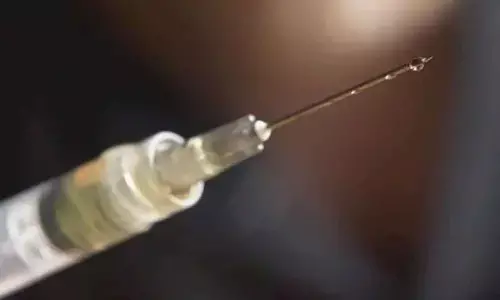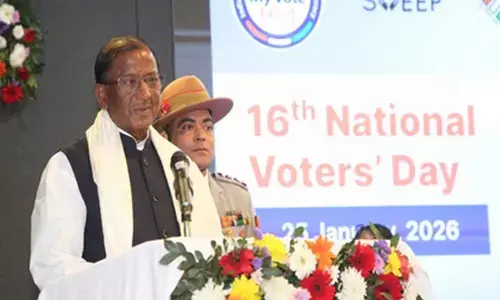Dharani Farming aims Rs 5 crore revenue by 2021
 Gondi Mahesh, CEO, Dharani FaM Coop Ltd and Sannappaiah, Training Coordinator, Organic Farming Programme, receiving Best Retailer Award in Home Needs, Manufacturers & Factory Outlets category from TS Finance Minister T Harish Rao at The Hans India Retail Ratna awards 2019 ceremony in Hyderabad recently. Telangana Governor Dr Tamilisai Soundararajan was also present
Gondi Mahesh, CEO, Dharani FaM Coop Ltd and Sannappaiah, Training Coordinator, Organic Farming Programme, receiving Best Retailer Award in Home Needs, Manufacturers & Factory Outlets category from TS Finance Minister T Harish Rao at The Hans India Retail Ratna awards 2019 ceremony in Hyderabad recently. Telangana Governor Dr Tamilisai Soundararajan was also presentLooks at adding more retail partners, increasing procurement from farmer members and improving processing capacity
Hyderabad: Riding on the demand for organic products, Dharani Farming and Marketing Cooperative, an organic farmer-owned social enterprise, has set a target to achieve Rs 5 crore in revenue from annual sales by end of FY2020-21.
At present, the cooperative under its umbrella has around 2,000 organic farmers, one processing unit and its own retail store at Chennekothapalli, Anantapur district in Andhra Pradesh.
It has partnered with over 300 retail stores to source its products, majorly across Hyderabad, Bengaluru, Chennai and other cities in South India. Their revenue from sales stood at Rs 3.83 crore for FY 18-19.
By end of FY21, Dharani plans to improve processing efficiency, partner with additional retailers, particularly in the South metros and increase procurement of crop from farmer members.
"Over the next year, our plan for Dharani is to increase its sales and revenue to Rs 5 crore, redesign its packaging and reduce usage of plastic to the bare minimum," Bablu Ganguly, Executive Director and co-founder, The Timbaktu Collective, told The Hans India.
Timbaktu Shop, a unit of Dharani Farming and Marketing Cooperative, in December received the Best Retailer award in Home needs, Manufacturers & Factory outlets category from The Hans India, as part of The Hans India Retail Ratna Awards-2019.
On organic farming, Ganguly said, all farmers in India should adopt organic farming, change their cropping pattern and manage farms better.
"This will lower a farmer's capital cost and will benefit the health of soil and animals. Besides, the organic way of cultivation will reduce a farmer's need for water; in the process, lets them face the climate change head-on," he added.
Ganguly also advises farmers to form FPOs (Farmer Producer Organisations) and sell their produce collectively in the market.
According to him, farmers should reduce the cultivation of only cash crops and in turn concentrate on healthy foods.
The market for organic products in India has been growing at a CAGR of 25 per cent and it is expected to touch Rs 10,000 crore to Rs 20,000 crore by end of this year. But, are all organic labels reliable enough to be considered organic?
Ganguly explains, "for 100 per cent organic products, consumers should look for certification logo (Participatory Guarantee Systems organic certified) from the PGS Organic Council.
However, the value-added products like 'Ready to Eat' and 'Ready to Cook' are not sold as certified organic as they contain five per cent to 10 per cent uncertified product, as per NSOP (National Standards of Organic Production) standards."
The Timbaktu Collective, a not for profit organisation, works towards sustainable development of marginalised people across more than 180 villages in drought-prone Ananthapuramu district of Andhra Pradesh.
The Collective's main strategy is to establish people institutions in the form of cooperatives.
Among the cooperatives promoted by the Collective is Dharani Farming and Marketing Cooperative (Dharani), which is an organic farmers' cooperative with 2,008 small farmers as shareholders, is marketing their products under the brand name, Timbaktu Organic.
The cooperative under Timbaktu Organic brand sells millets, rice, semolina, pulses, nuts, oil, butter, ready mix food, honey, and salt and sweet types of savoury snacks.
Speaking about pricing on organic products, Ganguly informed that getting an organic certification is a costly affair.
"However, the price at which Dharani sells its products is far less expensive against other organic players in the market.
I think Dharani should price its products higher for the farmers to get a better price," he concludes.














